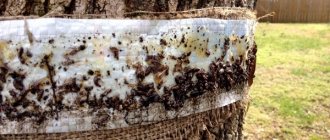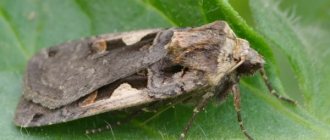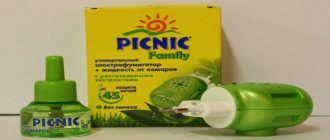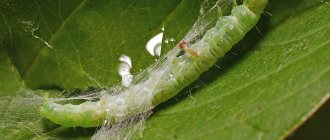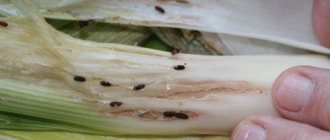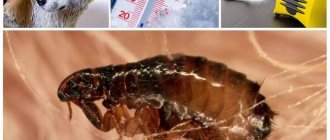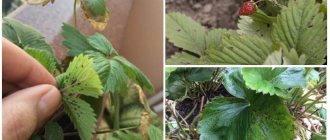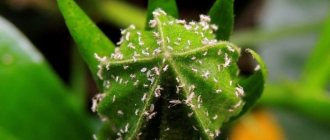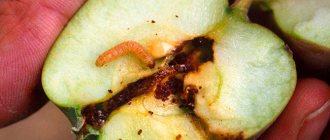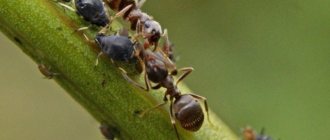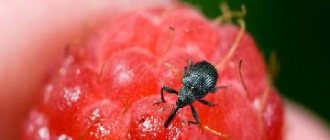The danger of aphids for roses
Rose plantings are attacked by a special type of these insects - the rose green aphid, which can not only harm the plants themselves, but also increase the risk of them developing serious diseases. In general, the affected bush has the following problems:
- the buds are deformed, the flowers dry out;
- the foliage becomes covered with a sticky powdery coating, curls and turns yellow;
- a sooty black fungus develops on plaque-covered leaves, impairing photosynthesis processes;
- the likelihood of contracting other infections increases;
- the plant weakens and dies.
Related article:
Fighting moles on the site
Aphids are small insects that live in large colonies and feed on plant sap. In dry, warm weather, they quickly increase in number and spread throughout the entire area.
The rose green aphid, which parasitizes rose bushes, becomes most active in May–June. The first individuals appear on the back of the leaves, and then reproduce by drawing out the juice from them. As a result, the foliage curls and dries, and parasitic insects occupy the buds. The lack of quick and effective treatment leads to their drying out and falling off.
It is easy to notice the presence of this pest on a plant:
- first, the green parts are covered with a sticky substance - the so-called honeydew, which the bugs secrete during their life;
- Over time, the leaves (and then the buds) begin to die, dry out and fall off.
When the first signs of aphids appear, you should immediately begin treating the entire rose garden.
Important! 5 most common rose diseases and effective ways to combat them
Why are aphids dangerous for roses?
The aphid family contains almost 4,000 species; On indoor plants you can most often see clusters of:
- White (or house) aphids are tiny (less than 1 mm) insects with translucent whitish bodies, which from afar can be mistaken for droplets of water and therefore the appearance of parasites may not be noticed in time.
- The green roseate aphid is a dangerous pest, endowed with an elongated bright green body and brown antennae, which brings new offspring every 14 days (starting from the end of May or the first days of June).
Aphids on roses
Larvae of both species can enter the home either from the street (through a window, during the ventilation of the room), or during the process of transplanting flowers into flowerpots with contaminated soil.
When even single individuals appear, a serious threat to the safety of indoor plants arises, since aphids, which reproduce by parthenogenesis (unisexual reproduction), can quickly create a huge colony that can destroy not only the bush it has chosen, but also other flowers nearby.
Dangerous in themselves, these small pests weaken the immunity of potted flowers, making them vulnerable to the invasion of pathogenic fungi and viral pathogens. In addition, the sweet honeydew they secrete is a favorable environment for the active reproduction of the sooty fungus Aspergillus, which can significantly reduce the level of photosynthesis.
That is why, if you notice signs of the presence of aphids on rose bushes, you must immediately begin to combat them in order to prevent the threat of the parasites spreading to neighboring plants.
Causes of the pest
Aphids spread very quickly and primarily attack those bushes that meet their requirements. The most attractive to this pest are juicy “fattening” shoots overfed with fertilizers. Timely, appropriate and strictly dosed fertilizing increases plant resistance to diseases and pests, while excessive overfeeding (primarily with nitrogenous substances) contributes to the appearance of aphids on roses.
Related article:
What do thrips look like on indoor plants?
With excessive nitrogen consumption, rose bushes weaken, since for normal development they also require other fertilizing, in particular potassium and phosphorus. Therefore, to provide the crop with all the necessary elements, complex fertilizers should be used, observing the characteristics of its growing season.
Another reason for a pest attack may be improper watering. Roses need sufficient moisture, but aphids prefer drought. Therefore, you need to regularly water the plantings and mulch the soil to retain moisture.
How to prevent aphids from appearing on roses: preventive measures
Recommendations:
- Prevention is of great importance in the fight against aphids. You should take good care of your rose bushes and plant them in well-ventilated areas.
- In addition, the absence of wind, as well as stagnant water, contributes to the appearance of parasites. Therefore, it is necessary that the bushes be thinned out.
- It is best not to plant them next to each other, and not to allow very close plantings so that the bushes touch each other.
- This will also encourage ants and aphids. In addition, it is necessary to regularly combat ants. This is due to the fact that ants contribute to the appearance of aphids on flowers and garden crops.
- It is necessary to regularly hill up roses and also treat them with ash.
- It is necessary to treat and water roses with nitrogenous fertilizers from time to time. They prevent the appearance and reproduction of aphids.
- By carrying out preventive manipulations, frequently inspecting the rose bushes and watering the plants with a hose, you will be able to avoid the proliferation of aphids. The fact is that even after you remove aphids from the leaves, if a small amount remains somewhere on the stems or on the back of the leaves, then after 3 or 4 days whole colonies of harmful insects will be found.
- Accordingly, it is necessary to fight it constantly and not skip watering, as well as inspection. You can remove pests by squashing. To do this, put on gardening gloves and simply crush the insects so as not to damage the leaves of the plant.
If you find an anthill in your garden, you can fight it with boiling water. To do this, pour a three-liter kettle of boiling water into the hole in the anthill. This should be done if the anthill is located at a decent distance from the rose bushes, so as not to injure the roots of the plants.
Rose bushes
You can fight ants with sweet baits. The fact is that ants specifically bring aphids onto garden crops so that they can provide them with sweet food. This is an amazing interaction between two species that promote each other's spread. Therefore, one of the options to remove aphids is to fight ants.
Options for dealing with ants:
- Sweet bait . To do this, you need to pour warm water into a small jar and dissolve two tablespoons of granulated sugar. You can also add a little honey. Ants have a big sweet tooth, so they won’t resist such bait and will eat it. Thus, they will be able to crawl into the jar, but they will not be able to get out of it.
- You can also fight ants with the help of special sticky belts , which are wrapped around fruit trees, as well as some shrubs. This option is not particularly effective for roses, because its stems are very thin, and therefore not very many ants will stick.
- Another option for ant control is to use sweet sponges . To do this, you need to soak a sponge in sugar syrup, throw it on the road, and wait until the ants stick to it. After this, the sponge covered with ants is thrown into boiling water. After cooling, it is rinsed and soaked again in a warm sweet solution and reused.
Remember that there are from 5 to 10 million individuals in one anthill, so the struggle can be lengthy. But this will help you get rid of not only the ants that gnaw leaves and fruits, but also the aphids that the ants bring into the garden plot.
Aphids on leaves
As you can see, fighting aphids in a garden plot is quite difficult, especially if there are a huge number of anthills in the garden along with them. You will have to fight not only with these small insects, but also with ants, since they specially grow aphids in order to obtain sweet sugar syrups.
The most optimal options for control are both treatment with special chemicals and traditional methods. Please note that traditional methods are effective only if there are not many insects on the flowers. There is only a small amount of it or you first noticed that the rose bushes were attacked by these insects. Otherwise, the fight using folk methods will be ineffective. In advanced cases, it is necessary to use several methods in a comprehensive manner, and carry out the treatment several times in a row.
Aphid
Effective folk recipes
If aphids appear on roses, before you fight them with folk remedies, you need to choose a proven and truly effective recipe. Using an ineffective method will waste time and delay the treatment process, which will allow the pest to actively reproduce, affecting neighboring plants.
Related article:
How to deal with scab on apple and pear trees
Tobacco
Tobacco infusion is prepared according to the following recipe:
- pour 10 liters of water into the container, add 400 g of tobacco powder;
- put on the stove and after boiling, simmer for half an hour;
- remove and leave to infuse at room temperature for 2 days;
- then filter, add 35 g of planed household or 2 tbsp. l. liquid soap, stir until smooth.
Rose bushes are sprayed with a break of 2-3 days until the insects are completely free.
Garlic
To prepare garlic infusion:
- grind or pass through a press peeled cloves from one medium-sized head of garlic;
- infuse in 1 liter of water for 24 hours;
- filter, pour in 1 tsp. dishwashing gel.
Spray roses every other day until the pest is destroyed.
Nightshade tops
Aphids are easily destroyed using potato and tomato tops. An infusion of potato stems is prepared as follows:
- 500 g of tops are steamed in 5 liters of boiled water;
- leave for 2 days, then filter.
Related article:
How to drive moles out of your area: 5 simple but effective methods
Tomato tops are used differently:
- 4 kg of greens are placed in a container (can be left over after pinching), 10 liters of water are poured in;
- put on fire, cook for half an hour;
- cool, filter;
- diluted with water in a ratio of 1:5;
- add 40 g of planed laundry soap;
- stir until smooth.
Bushes are treated once every 3 days.
Citrus peel
Aphids are well destroyed by infusion of orange or lemon peels. To prepare it:
- the peel is filled with water at the rate of 300 g per 1 liter;
- leave for 4 days in the dark, then filter.
The resulting product is sprayed on roses at intervals of 3 days.
Onion peel
An infusion of onion peels is prepared as follows:
- pour 200 g of husk into 10 liters of water;
- leave for 5 days in a warm place, filter.
The affected and neighboring healthy bushes are sprayed daily.
Mistakes gardeners make when processing roses
It is necessary to fight aphids after noticing the first specimens. Don't wait, as the insect reproduces very quickly. All rose lovers try to take aphids seriously. However, there are also common mistakes.
Mistakes gardeners make when treating roses for aphids:
- When treating roses with soap, it would be a mistake to choose a liquid with a strong fragrance. This will attract aphids rather than repel them. Tar soap will be just right.
- It is necessary to carefully treat not only the top of the plant and buds, but also the bottom of the leaves: this is where the aphids gather very densely.
- A soap and soda mixture is effective against aphids. However, you should not apply soda alone to roses: it is quickly washed off from the plants and carried away by wind and rain.
- There is no need to treat roses with the same chemical. Oddly enough, aphids develop immunity. It is necessary to choose a new effective drug each time.
- It would be a mistake to start processing already in mid-spring. Insects will appear on roses at the first sign of warmth.
- Some rose lovers value only traditional methods. However, spraying with decoctions, extracts, and herbal infusions with soap and water are useless if there are already several hundred insects.
- When using chemicals against aphids, you should carefully read the instructions. Some are sprayed alternately, some once a season. Do not overestimate the dose. Otherwise, you can destroy the plant, wanting to save it.
- Spraying with preparations is carried out in the evening so as not to disturb the bees and not harm them. If the roses are indoors, spraying with chemicals is done in the fresh air.
- Young shoots of roses should not be treated with strong chemicals, as this will damage them.
- There is no need to drive beneficial insects and birds away from the site: they will be assistants in the fight against aphids.
- Leaves affected by insects should be carefully burned, otherwise this will help it reproduce again.
Rose varieties least susceptible to pests
Roses that do not get sick are probably found only in a gardener’s dreams. This is an ideal that is very difficult to achieve. However, there are still varieties that are closest to it.
Rose varieties that are less susceptible to aphids and other pests:
- Avila Palace;
- Dominique Loiseau, a highly pest-resistant variety;
- Roses of Cordes;
- Meillan's Les Rosiers Farniente;
- "Noak";
- Musk hybrids;
The plant's ADR certificate also speaks about health and increased resistance to pests. This means that the variety has undergone long-term testing, it is durable and hardened. You should not buy a rose “from hand” if you want to see a blooming garden full of perfection.
Mechanical methods
If aphids have just appeared on roses, then they can be destroyed using simpler methods, since you can get rid of a small number of insects without the use of folk remedies, much less chemicals. Mechanical methods are excellent for this - rinsing with water under pressure or crushing with gloved fingers.
In the first case, a spray bottle or hose is used, the stream from which simply washes off the pests from the leaves. The procedure is repeated daily to remove the young animals that will emerge from the eggs. Bugs that fall to the ground become helpless and are usually eaten by enemy insects.
Related article:
What are insecticides and how do they work?
In the second option, only gloves are required. The aphids are crushed with your fingers, and after finishing the work they are washed off the foliage with water. Small insects with a soft body are easily destroyed without any unpleasant sensations. The gloved hand is periodically washed in water to remove the adhering mass. If you carry out such an event every day for 7 days, then gradually the number of parasites will decrease and then disappear.
How to spray roses against aphids?
Just because folk methods use natural ingredients doesn't mean you shouldn't be careful with them.
Wear a thick, long-sleeved shirt and gloves to protect yourself from thorns. Set the sprayer to a wide spray rather than a narrow stream. Although a strong stream may knock some of the insects off the plant, you need to wet the pest. On roses, colonies often form on the buds and undersides of leaves, so spray these areas thoroughly.
Spray the liquid from a distance of 30 cm, starting from the lowest point where you notice the larvae and working your way up the rose bush. Apply products every 5-7 days until the bushes are clean. The best time to spray is a calm evening, so you will not harm bees and other beneficial insects.
Try the home remedy selectively on one branch first so that the plant responds well to it.
Neighboring plants
There are plants that can repel or attract aphids, so you need to choose the right neighbors for roses. Sage, marigolds, mint, daisies, lavender, parsley and dill have strong aroma that these pests cannot tolerate. All of these crops are popular in most areas and are easy to care for. Growing them will not cause trouble, but will help to avoid damage to rose bushes.
Flowers that attract aphids should be planted further away from roses. These include begonia, petunia, cosmos, capuchin, mallow and decorative poppy. Among tree crops, these pests love viburnum, linden, mulberry and bird cherry.
Natural enemies
In nature, the enemies of aphids are some insects for which they serve as food. Among them are the following:
- ladybug is the main consumer, capable of destroying up to 50 aphids per day;
- sand wasp, cricket, cicada, ground beetle, tick (mite), ichneumon beetle, spiders.
Related article:
What are insecticides and how do they work?
Of the birds, tits and sparrows eat aphids in the largest quantities. Toads also feed on it.
To attract enemy insects, aromatic and spicy herbs are planted near the rose garden. Birds can be lured using feeders and drinkers.
Recommendations for planting plants next to roses
When choosing a place to plant a rose, it is worth knowing which plants should be placed nearby and which ones should be discarded. After all, there are flowers and plants that help attract pests, and there are those that repel them.
Plants that attract aphids:
- mulberry;
- Linden;
- viburnum;
- bird cherry.
Roses' Best Neighbors - video
These trees awaken much earlier than roses and accordingly attract insects. By the time the rose awakens, the number of pests will be huge. There is a high probability of damage to the rose. As a rule, in such a situation you cannot do it with folk remedies alone.
There are flowers that should not be planted next to a rose:
- begonia;
- nasturtium;
- mallow;
- cosmos;
- petunia;
- poppy.
Plants are rose's allies
The best protectors of roses are herbs and plants. Pests are afraid of such scents.
It is better to plant the following plants next to the rose that protect against pests:
- dill;
- fennel;
- sage;
- mint;
- thyme;
- parsley;
- marigold;
- daisies.
Plants such as lupine, clover, and rapeseed distract insects.
Several interesting and unusual recommendations for eliminating aphids on roses
Ladybugs are the best protectors of roses.
Unlike the same ants, one insect can destroy up to 700 aphids. Insects are attracted by planting chamomile, tansy, and dill.
Dandelions are also useful in the garden plot and are not a weed.
Wasps, wasps, and lacewings flock to them and feed on aphids and larvae.
Birds are excellent helpers in the fight against pests, so don’t be lazy and install birdhouses.
Another amazing ally in the fight against aphids are toads.
They adore aphids and their larvae and constantly hunt for them. When there are toads in the garden, you can be sure that the plants, in particular roses, are safe. Toads definitely need to drink, and therefore it is necessary to place bowls with clean water next to the trees. All major rose gardens in the world do exactly this.
So, aphid damage to roses occurs quite often at home, in open ground, and in greenhouses. Don't despair. There are many means to combat the pest, of which folk remedies account for a significant part. There are chemicals. The best thing is to take preventive measures and prevent the pest from appearing.
The best is a systematic approach, when both prevention and proper care are applied.
In this case, the roses will be healthy, beautiful and fragrant.
Preventive measures
Prevention is necessary so that aphids cannot take root on roses, since fighting pests even with traditional methods is always more difficult than preventing their appearance. The main preventive measures include:
- regular watering, mulching;
- application of complex fertilizers;
- planting favorable neighboring plants, attracting enemies;
- constant monitoring and timely destruction of the first individuals by mechanical means.
Diseased or damaged parts of the bush must be removed in time to prevent the spread of parasites. It is also important to place the rose garden in the right place and provide it with proper, proper care. Such preventive measures will protect roses from damage not only by aphids, but also by other pests or diseases.
What are the dangers of chemical treatment?
Chemicals can be used to control pests on roses without fear. It is on fruit trees and other crops, the harvest of which is then used for food, that you need to be careful. Roses are grown exclusively for decorative purposes.
On the other hand, rose bushes should be treated more carefully if they grow in close proximity to garden crops. In this case, it is advisable to prevent chemicals from coming into contact with other plants.
In general, it is always recommended to treat aphids only as a last resort. First, you can use careful folk recipes that are not capable of causing significant harm to the crop or soil, but effectively drive away and kill aphids. And only if the aphids are multiplying at an alarming rate, give preference to chemical agents.
